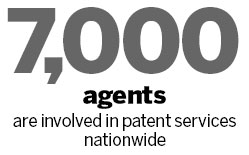Investment
SIPO book: IP agency shortfalls and outlook
By Wang Xin (China Daily)
Updated: 2010-10-27 08:13
 |
Large Medium Small |
Intellectual property services are crucial to industrial transformation and the competitive edge of a company and even a nation, said Yang Tiejun, vice-commissioner of the State Intellectual Property Office (SIPO).
Yang made the remarks in Beijing at a ceremony to launch publication of an essay collection titled Intellectual Property Services and Technological and Economic Development.
The book is the result of SIPO's nationwide essay competition that began in March to promote development of intellectual property services and examine theory and practices in the field.
Of the 130 entries submitted in the competition, 67 were included in the final collection.
Topics range from access, regulation and management of patent agencies to research and application of information, industrialization of intellectual property, service criteria, patent securitization and strategies for a national system of intellectual property services.
Also including policy interpretation and case analyses, the collection is expected to provide needed insight on the industry and boost technological progress, according to SIPO.

Some of the book's writers attended the launch ceremony, which also included experts who discussed developing trends in patent services.
The subject is timely because there is now vicious competition and lack of professional integrity that is devastating the industry, said Wang Jingchuan, former chief of SIPO, who contributed an article to the book.
There are now 7,000 patent agents nationwide.
Mao Jinsheng, head of SIPO's intellectual property development research center, noted the importance of patent documentation because it combines technological information, business and legal rights.
Patent agents should be trained in information analysis to provide more valuable services, he suggested.
The knowledge-intensive service sector is projected to contribute around 70 percent to regional GDP in the near future, said Cai Yonglian, an official with the Shanghai patent administration and also a contributor to the book.
Traditionally, intellectual property services covered agency in application and registration, litigation and consultancy. The sector has now expanded to evaluation and trade in patents, trademarks and copyrights.
Early warning of potential infringements, trusteeship and securing loans using intellectual property as a collateral are all included in the sector, said Yang from SIPO. "As China is now on the stage of restructuring industries and shifting to an eco-friendly and resource-efficient growth pattern, there is a growing need for intellectual property services," he said.
China Daily